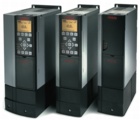Inverter drives have the power for change

Retailers ASDA and Tesco make extensive use of Alldales variable-speed drives in air-handling systems. ASDA has installed drives in 77 stores as one of its measures to cut emissions by 20% by 2012. Following a 43% reduction in energy used by fans in air-handling systems in its stores in the south of England, Tesco retrofitted drives in over 350 larger stores.
Ray Edwards shares his experiences of huge and extremely cost-effective energy-saving potential of variable speed drives for fans and pumps.The argument for tackling energy waste in public and commercial buildings is indisputable. In June 2008, the Government revealed that UK buildings produce around 47% of the UK’s total emissions of greenhouse gases. Much of these emissions are the result of the inefficient operation of building plant and systems. Recent media coverage — particularly following Government announcements on future energy sources — has to a large extent focused on the supply side of the energy equation. Equally important, however, is to tackle the demand side. Changes to the ways systems are specified and managed, with the introduction of appropriate energy-saving technologies, can make a real difference to consumption during a building’s lifetime — the ultimate definition of sustainability. Between half and a third of the energy used in a typical building is used to power centrifugal pumps, fans and compressors fitted to ventilation, space heating and cooling systems. These systems are largely driven by electric motors, often running unnecessarily at full speed. It has been calculated that the use of electric motors in industry accounts for almost two-thirds of the UK's entire industrial electricity consumption. Despite all the evidence, the vast majority of AC motors used in buildings still have little or no speed control — with some in the industry estimating the proportion to be as high as 90%. Many purchasers concentrate on the initial cost of the motor, not realising that energy running costs can be up to 10 times this amount in a single year. This can be a major issue in today’s high-performance buildings — where there may be many motors. Inverter drives are not new. The technology behind them — also known as variable-speed technology — has been around for many years. As a practical solution, however, the inverter drive remains as valid as ever. Moreover, when linked to central building-management systems, the sophisticated technology of the latest inverter drives plays a key role in achieving intelligent building control. By adjusting motor speeds to match output requirements, inverter drives deliver improved energy savings at standard flow rates when compared to more traditional methods of regulating the flow of air and fluids such as dampers and valvess. Because motor speed and energy consumption are exponentially related, relatively small reductions in speed can lead to major savings. At Alldales, we've seen the evidence on real-life projects that reducing the average fan speed by 15 to 20% can save up to half of the equipment’s energy costs over the year. With today's increasing focus on the whole-life costs of a building rather than simply the initial construction costs, architects and designers are keen to explore how they can reduce the running costs of building facilities over the longer term. This means that the efficiency of the HVAC system is key. We have seen the inclusion of inverter drives in the specifications for new buildings and systems increasing as their overwhelming benefits to whole-life building costs are becoming better known. Particularly useful in buildings where occupancy and usage patterns create a continuously variable demand, the flexibility of today’s variable-speed drives also offers a relatively inexpensive and effective solution to improve the carbon footprint of existing building stock.

Once regarded as cumbersome and expensive items residing in dedicated plant rooms, modern HVAC-specific drives require less cabling and minimise the need for additional hardware in managing complex connections — and can be situated just about anywhere. By removing the need for dedicated plant rooms, lettable space can be maximised. Alldales also increasingly works with manufacturers and consultants to integrate drives as part of bespoke solutions for specific applications. The technology has successfully been employed, for example, for low noise on-floor air handling systems in a number of buildings in Canary Wharf. Variable-speed drives offer a cost-effective way of controlling unnecessary energy use on an ongoing basis. Custom designed for HVAC systems, the new intelligent variable-speed drives link to building-management systems to deliver optimum lifetime operating efficiencies. For example, Alldales’ inverter drives are fully compatible with BMS open protocols and can interrogate building-management systems for instructions on how to vary the speed of the fans to match requirements and also relay back vital information about the condition of belts and filters. Additionally, by capturing and providing usage information to the BMS, inverter drives can help confirm the savings achieved, proving the case for investment and providing evidence of compliance to achieve necessary certification. Considering the huge potential of inverter drives to cut energy consumption, not to mention tax savings in the first year of purchase through the Government’s Enhanced Capital Allowances scheme, as well as suitability for retrofitting, this simple, reliable and proven device deserves its place in the current line-up of technologies being employed in making buildings more energy efficient. Ray Edwards is managing director of Alldales Drive Systems

Reducing the average speed of a fan or pump by 15 to 20% using inverter drives on real-life projects can save up to half of the equipment’s energy costs over the year.
Related links:











